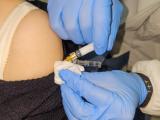New antibiotic development is getting a much-needed shot in the arm.
CARB-X, a public-private initiative that aims to boost discovery and development of novel antibiotics and diagnostic tests to combat antibiotic resistance, announced today it will be awarding $24 million to 11 biotech companies working on new antibacterial products that target gram-negative bacteria.
The announcement marks the first phase of funding by CARB-X (the Combating Antibiotic Resistant Bacteria Biopharmaceutical Accelerator), a joint US and UK effort launched in July 2016 to help provide a financial boost for global antibacterial innovation and development, which has been hampered both by scientific challenges and a lack of financial incentives. CARB-X officials hope the funding will help accelerate research and bring new antibiotics to market faster.
"This is a great day for antibiotic research and development," CARB-X executive director Kevin Outterson, JD, said at a press conference announcing the awards.
Novel treatments for priority pathogens
The awards include an initial investment of $24 million in the 11 projects, which were chosen from among 168 applications by an advisory board of antibiotic experts. CARB-X will also be awarding an additional $24 million in milestone-based payments to the companies to advance the projects beyond the early stages of development. The companies are matching the money with private funds to bring the total investment to $75 million.
The projects, all in the early stages of discovery and development, include three potential new classes of small-molecule antibiotics with activity against gram-negative bacteria and four non-traditional products that use alternative approaches to fighting gram-negative pathogens. All 10 of the therapeutics in the portfolio target the bacterial pathogens identified as urgent threats by the World Health Organization and the US Centers for Disease Control and Prevention, Outterson said.
Among the companies in CARB-X's initial portfolio are:
- Entasis Therapeutics, which is developing a novel oral agent to treat multidrug-resistant gram-negative bacteria such as carbapenem-resistant Enterobacteriaceae
- Visterra, which is designing and developing an antibody-drug conjugate that kills Pseudomonas bacteria
- Contrafect, which is developing lysins (bacteriophage-derived enzymes) as part of a treatment for infections caused by Pseudomonas aeruginosa.
Proteus IRC, the lone diagnostics company among the winners, is working on a rapid diagnostic imaging tool that can visually identify bacteria in the lungs within 60 seconds.
"This partnership will provide key resources to accelerate development of our program, helping us fulfill our commitment of bringing innovative cures to patients suffering from serious bacterial infections," Entasis CEO Manos Perros, PhD, said in a company press release.
"I can't help but be greatly encouraged by these companies," Outterson said. "If just one succeeds, it will be the most significant innovation against gram-negative bacteria in my lifetime."
Problems with the antibiotic pipeline
With growing antibiotic resistance diminishing the effectiveness of current drugs and new multidrug resistant "superbugs" emerging, the pipeline for new antibiotics is in desperate need of a boost. The last new class of antibiotic approved, which included daptomycin, was discovered in 1984, and the last antibiotic for gram-negative bacteria was discovered in 1962.
But developing new antibiotics is an expensive proposition, and because any new antibiotic would be used sparingly to prevent resistance, the potential return on investment is much smaller, despite the tremendous need.
As a result, large drug companies haven't been focusing their efforts on antibiotics. In 2016, only four large drug companies were involved in antibiotic development. Overall, Kathy Talkington of the Pew Charitable Trusts' antibiotic resistance project told the audience, there are currently 40 antibiotics in development, and 70% are already in existing classes.
The hope is that initiatives like CARB-X can provide smaller drug and biotech companies the type of "push incentive" that is crucial in the early stages of novel drug development, when the cost and risk of failure are high. But Outterson, who likened the effort to the cancer "moonshot" championed by former US Vice President Joe Biden, explained that because the need for stewardship destroys the market for new antibiotics, the world also needs to rethink how it rewards companies for developing new antibiotics.
"We need serious reform to the market," he said, suggesting that new antibiotics should be rewarded for their value to society.
CARB-X is funded by the Biomedical Advanced Research and Development Authority (BARDA) and the Wellcome Trust, a global charitable foundation based in London, with additional support from the National Institute of Allergy and Infectious Diseases (NIAID).
"Today is really important because it's the point at which we are turning awareness into action," Wellcome Trust director of policy Ed Whiting said.
Outterson said CARB-X will be announcing more winners later in the year. The initiative has pledged to commit as much as $450 million over the next 5 years to spur new antibiotic research and development.
See also:
Mar 30 CARB-X press release
Mar 30 Entasis Therapeutics press release























